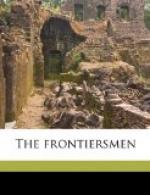A windy day it was; the clouds raced through the sky, and their shadows skimming over the valleys and slopes challenged their speed. The Tennessee River was singing, singing! The mountains were as clearly and definitely blue as the heavens. That revelation of ranges on the far horizon unaccustomed to the view, only vouchsafed by some necromancy of the clarified autumnal air, never before seemed so distinct, so alluring—new lands, new hopes, new life they suggested. Wyejah’s scarlet attire, its fringes tasseled with the spurs of the wild turkey, rendered his lithe figure strongly marked against these illusory ethereal tints as he sped abreast with Otasite along the level sandy stretch of the chungke-yard. And how well he played! Varney realized this with a satisfaction as of having already won his wagers, many and large, for Otasite would leave the nation should he be victorious, and having drunk unwittingly of Herbert’s Spring, he could not quit the Cherokee country, although he himself was still unaware of having quaffed of those mystic waters. Therefore defeat was obviously his portion. Whenever the trader thought anew of his secret knowledge of this fact he offered odds on Wyejah, and glanced at him with approbation—at the young Indian warrior’s face fiercely, eagerly smiling, his great flattened ears distended on their wire hoops, his dark eyes full of sombre brilliance. How well he played! and how hard the skill of his opponent pressed him! How accurate was the aim of the long lance of Otasite as he poised his weight on the supple tips of his white moccasins and hurled the missile through the air; how strong and firm his grasp that sent the circular, quartz chungke-stone, whirling along the sand; how tirelessly his long sinewy steps sped back and forth in the swift dashes up and down the smooth spaces of the chungke-yard; how faithfully he was doing his best, regardless of his own preference in the interests that he had adventured on the result! How like a Briton born it was, Abram Varney thought, for he alone knew of Otasite’s resolution, and the significance of the game to him, that the boy could thus see fair play between the factions that warred within him for his future. He had staked the future on the event,—and suddenly it was the present!
A wild clamor of excitement, of applause, rose up from the throats of the crowd in the natural amphitheatre, clanging and clattering in long guttural cries,—all intensified by a relish of the unexpected, a joy in a new sensation, for Wyejah had never before been beaten, and Otasite was the victor at chungke.




